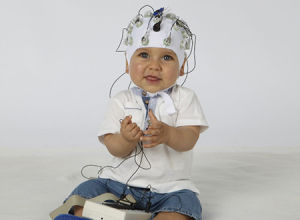Babies have a better moral compass when their parents are fair and just, too
Ars Technica » Scientific Method 2015-09-02
Understanding the difference between right and wrong is part of a cognitive toolkit that starts out early in life and grows in complexity. There are still countless mysteries about that growth: how much of the moral toolkit are babies born with? What pieces fall into place at what age? How does a baby’s environment affect its moral cognition, and how does moral cognition affect behaviour?
A paper in this week’s issue of PNAS builds on previous studies of infant morality to explore what happens in babies’ brains while they watch social interactions. The authors also determine how these neural signals match up with their own behaviours and their parents’ beliefs.
For the study, babies were shown animated characters that either helped or hindered each other. The researchers found that the babies had different neural readings depending on whether the interaction between the animated characters was prosocial or antisocial. They also found that the strength of this difference was linked to their parents’ beliefs about justice. Children with a larger difference in their neural patterns were also more likely to reach for a toy of the helpful character later.
